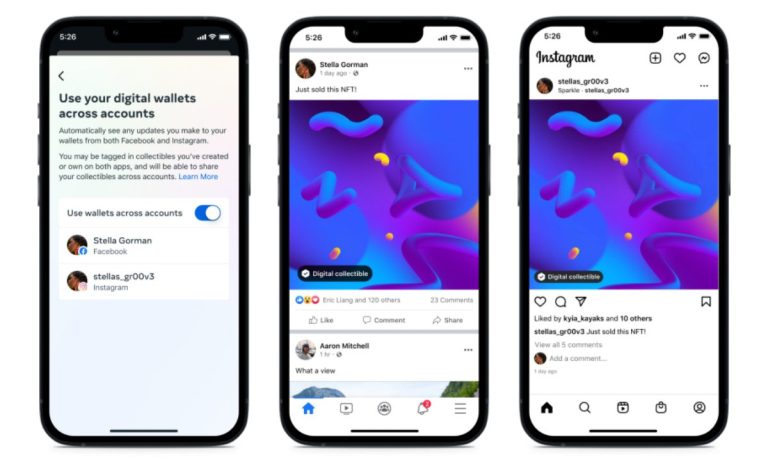NFT Thefts Hit $100M in ’22; Facebook Adds Tokens

More than $100 million worth of non-fungible tokens (NFTs) were stolen in the 12 months ended in July, blockchain research firm Elliptic reported on Aug. 24. That worked out to an average of $300,000 per theft.
Its report, “NFTs and Financial Crime: Money Laundering, Market Manipulation, Scams & Sanctions Evasion Through Non-Fungible Tokens,” noted that “actual numbers are likely to be higher, as thefts are not always publicly reported.”
The worst month was this July, when 4,600 were stolen, the report said.
See also: Report: Record Number of NFTs Stolen in July
The report also found that $8 million has been laundered through NFTs since 2017. Beyond that, the blockchain data firm said “there is a growing threat to NFT-based services from sanctioned entities and state-sponsored exploits.”
The highest profile of these thefts was from actor Seth Green, whose is using his Bored Ape Yacht Club avatar as the star of an otherwise-live action TV show he is producing. He reportedly bought it back for more than he paid the first time around.
Read more: Seth Green’s Kidnapped Bored Ape Shows NFTs’ Growing Commercialization
Meta Adds Facebook NFTs
Social media conglomerate Meta has added the ability to display NFTs on Facebook, expanding the capacity from its Instagram platform on Aug. 29. Users will be able to cross-post their NFTs, linking them to both sites at once by connecting a digital wallet containing the token.
Related: Meta Expands NFT Sharing Feature From Instagram to Facebook
NFT capacity was added to Instagram in May, expanding to 100 countries worldwide on Aug. 4.
While Twitter preceded Instagram and Facebook in allowing users to link NFTs to their profiles, it focused mainly on profile pictures, which got a special border denoting a linked NFT rather than a cut-and-pasted image.
We’re introducing the ability to post digital collectibles across @facebook and @instagram. You can now connect your digital wallet to either app to share your #NFTs on both.
What NFT are you excited to share? 👀https://t.co/wa2wkWfI7p pic.twitter.com/SlpwAuY02c
— Meta Newsroom (@MetaNewsroom) August 29, 2022
The expansion onto Facebook and Instagram could help the NFT industry grow substantially, as it provides a big reason to own them for a far larger group of people — 2.3 billion Facebook users being a substantial increase, even if you do need a separate digital wallet at this point.
“Creators are using new technologies like NFTs to take more control over their work, their relationship with their fans and how they can monetize,” Meta said in a press release in May. “At Meta, we’re looking at what creators are already doing across our technologies in order to improve the experience, help them create more monetization opportunities and bring NFTs to a broader audience.”
NFT Royalties Easily Dethroned
The ability to add royalty payments to any resale of an NFT could be a big boon for artists, musicians and others. But while the idea has the potential to reboot the creator economy — it has been quickly embraced by musicians, whose income has been slashed by the advent of streaming music sites — it has a big hole.
The addition of royalties can’t be enforced, as the NFT’s own smart contract can’t tell who it’s been sold to — or for how much. Instead, the process relies on NFT marketplaces to respect, collect and enforce the royalty requests. While most of the large sites do, several decentralized finance (DeFi) have cropped up that specifically cater to owners who want to bypass royalties.
See also: NFT Royalty Payments: Potentially Game-Changing, Easily Bypassed
Digital artist and royalty collector Mike “Beeple” Winkelmann — best known for the $69 million NFT sales that brought NFTs to the wider public’s attention last year — took to Twitter to point out, “We can’t ‘smart contract’ our way around this. If I have a NFT and I decide to ‘gift’ it to someone, and then they ‘gift’ me 10ETH afterwards, we have gotten around royalties. If someone can explain to me how any smart contract will EVER stop that I’m all ears …”
The solution, he said, is that “creators will have to build a collector base that WANT to honor these royalties …. It’s really that simple.”
And that is complex, as musicians learned several decades ago when Napster turned mass pirating into a home hobbyist activity.
Going, Going …
In other news, top auctioneer Sotheby’s has hired an NFT specialist for its digital art team, The Block reported. Brian Beccafico, who goes by @Arthemort, is joining the famed house as it expands an NFT market presence that began with the $17 million sale of an NFT titled “The Fungible” by digital artist Pak.
In October 2021, it launched Sotheby’s Metaverse, an NFT sales platform that is not, in fact, in an actual metaverse.
For all PYMNTS crypto coverage, subscribe to the daily Crypto Newsletter.